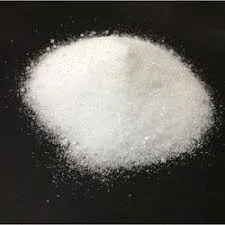Carboxymethyl Cellulose An Overview of Its Properties and Applications
Carboxymethyl cellulose (CMC), a derivative of cellulose, is a water-soluble polysaccharide that has gained remarkable importance due to its versatile applications across various industries. This compound is derived from cellulose, the most abundant organic polymer on Earth, found in plant cell walls. The modification of cellulose into CMC involves the carboxymethylation process, wherein carboxymethyl groups are introduced, significantly altering its properties and enhancing its functionality.
Physical and Chemical Properties
CMC is characterized by its white, odorless powder form, which dissolves in water to create a viscous, clear solution. Its degree of substitution (DS) – the average number of carboxymethyl groups substituted on each glucose unit – influences its solubility, viscosity, and other functional properties. CMC can vary in viscosity, allowing formulators to choose the appropriate grade for specific applications.
One of the most critical properties of CMC is its thickening ability. As a hydrocolloid, CMC can increase viscosity without imparting taste or color, making it an excellent thickening agent in food products. Additionally, CMC is stable over a wide pH range and temperature, which enhances its utility across various conditions.
Applications in Food Industry
In the food industry, CMC is primarily utilized as a thickener, stabilizer, and emulsifier. It is commonly found in ice creams, sauces, salad dressings, and baked goods, improving texture and mouthfeel. In the production of ice cream, for instance, CMC prevents the formation of ice crystals, resulting in a smoother and creamier product. Furthermore, it helps to maintain the stability of emulsions, ensuring that oil and water phases do not separate.
Moreover, CMC is a gluten substitute in gluten-free bakery products, enhancing texture and moisture retention. Its ability to bind water makes it an essential ingredient in improving the shelf life of various food items by preventing staleness and microbiological spoilage.
carboxymethyl cellulose

Pharmaceutical and Cosmetic Applications
Beyond the food sector, CMC plays a critical role in the pharmaceutical industry. It is widely used as a thickening agent in liquid formulations, providing viscosity to syrups and suspensions for improved palatability. Additionally, CMC acts as a binder in tablet formulations, ensuring uniformity and stability.
In cosmetics, CMC is utilized for its emulsifying and thickening properties. It helps stabilize creams, lotions, and gels, providing a desirable texture and enhancing the product's sensory attributes. Furthermore, it can improve the skin feel of various formulations, making it a valued ingredient in many personal care products.
Industrial Uses
The industrial applications of CMC extend to paper, textiles, and oil drilling industries. In the paper industry, CMC is employed as a sizing agent, enhancing the strength and water resistance of paper products. In textiles, it acts as a thickener in printing pastes, allowing for sharper designs and improved quality.
In oil drilling, CMC is used as a viscosifier in mud formulations, helping to maintain viscosity while preventing fluid loss in the borehole. This application is critical for maintaining the stability of the drilling process and ensuring the successful extraction of oil and gas.
Conclusion
Carboxymethyl cellulose is a multifunctional polysaccharide that has found extensive application in numerous industries due to its unique properties. From its role as a thickener in food and pharmaceuticals to its utility in industrial applications, CMC continues to be a crucial component in product formulations. As research progresses and new applications are discovered, CMC’s versatility and effectiveness will likely ensure its relevance in future innovations and formulations. The ongoing exploration of CMC's potential in emerging fields demonstrates its significance as both a functional ingredient and a key player in improving product quality across diverse sectors.
-
Rdp Powder: Key Considerations for Wholesalers in the Building Materials IndustryNewsJul.08,2025
-
Key Considerations for Wholesalers: Navigating the World of Hpmc - Based ProductsNewsJul.08,2025
-
Hpmc Detergent: Key Considerations for WholesalersNewsJul.08,2025
-
Key Considerations for Wholesalers: China Hpmc For Tile Adhesive, Coating Additives, Concrete Additives, and MoreNewsJul.08,2025
-
Crucial Considerations for Wholesalers: Navigating the World of Construction MaterialsNewsJul.08,2025
-
Key Considerations for Wholesalers Sourcing Additive For Cement, Additive For Concrete, Additive For Putty from Additive Manufacturer Shijiazhuang Gaocheng District Yongfeng Cellulose Co., Ltd.NewsJul.08,2025




